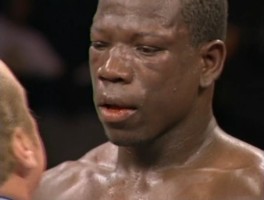 21.05.07 – By Eric R. Sloan: On May 5, 2007, Oscar De La Hoya and Floyd Mayweather, Jr. put on one of the most financially rewarding sparring sessions in boxing history, which was incorrectly titled “The Fight to Save Boxing.” From the press conferences to HBO’s 24/7 series, we were led to believe that the world was awaiting something explosive. By the millions, we paid for the hope of explosiveness. After it was over, we realized that we had purchased a sparkler instead of a bottle rocket. The reality is that no single fight can save the sport.
21.05.07 – By Eric R. Sloan: On May 5, 2007, Oscar De La Hoya and Floyd Mayweather, Jr. put on one of the most financially rewarding sparring sessions in boxing history, which was incorrectly titled “The Fight to Save Boxing.” From the press conferences to HBO’s 24/7 series, we were led to believe that the world was awaiting something explosive. By the millions, we paid for the hope of explosiveness. After it was over, we realized that we had purchased a sparkler instead of a bottle rocket. The reality is that no single fight can save the sport.
The middleweight encore was staged on Saturday night. The FedEx Forum in Memphis looked like a ghost town, which was probably fitting since the only star from who emerged was Kelly “The Ghost” Pavlik. Pavlik dismantled the hard-hitting Edison Miranda in the seventh round; however, an argument could be made that the fight should have been stopped a round earlier.
Even though Pavlik’s 31-0-0 record with 28 knockouts appears impressive, it wasn’t until Saturday night’s performance that he earned long overdue respect and recognition. He is technically sound, he has power in each hand, a chin that withstood Miranda’s bombs, and a defense that invites action. He is also very hungry. Unfortunately, he is still not guaranteed a title shot for primarily two reasons: (1) the champion wants no piece of him; and (2) Pavlik’s career has mostly been hidden from the public.
Jermain Taylor, the current middleweight champion, showcased the main event with the goal of opening up some bad intentions on Cory Spinks, a blown up welterweight. As usual, Taylor looked nervous, quirky, and stiff. Spinks showed a clear speed advantage and was never in any serious trouble. At the end of a close fight, a gift was given to Taylor in the form of a split decision and he retained the title. For the second consecutive fight, “Bad Intentions” has struggled against a smaller opponent—opponents who had no right to be fighting for the middleweight title.
In retrospect, the “Fight to Save Boxing” should have been between De La Hoya and Taylor. De La Hoya would have taken the belt from Taylor and the Golden Boy could have finally retired with yet another weight division under his control. Such a move would have allowed the crowded middleweight division to finally obtain clarity. Instead, we are left with the same old confusion and speculation about what is wrong with our beloved sport.
Contrary to common belief, however, boxing is not dead. There are many exciting fights and potential match-ups that have the ability to relight the pugilistic spark from time to time. So the question remains, what does boxing need “saved” from? The answer is itself, HBO, and mixed martial arts.
While mixed martial arts has its own identity problems, each version has the following things in common: (1) one true champion; and (2) fewer weight divisions. It simply lacks the history and money that boxing brings to the table; however, the latter is quickly reaching parity. The other problem with mixed martial arts is that championship belts come and go faster than a Mayweather counterpunch.
On the other hand, boxing has an endless supply of weight divisions and enough championship belts for everyone with at least ten fights. Boxing also has HBO—the real matchmaker within the sport. For HBO to tell us how bad the Taylor-Spinks match-up makes as much sense as Don King telling us the difference between a good hair day and a bad one. HBO blessed Taylor-Spinks or the fight never would have happened.
As such, in order to achieve the first step in the comprehensive plan to save boxing, the life support switch must be taken from HBO. Frankly, it is a conflict of interest for a cable network to have its own stable of fighters. It has the right to cover a fight and nothing more. The sanctioning organizations, all ten thousand of them, do nothing to prevent HBO’s meddling in this regard. This is not to say that HBO is strictly to blame for the current state of boxing. Undoubtedly, HBO would have rather had Taylor fight Pavlik or Miranda. The network had also blessed Sergio Mora before Spinks, but Mora unilaterally backed out. A Taylor-Wright rematch also would have made more sense. Simply stated, HBO’s champion wants no part of a legitimate fight with a real middleweight.
The bottom line is that HBO, Showtime, and the sanctioning bodies allow fighters like Kelly Pavlik, John Duddy, Joe Calzaghe, and numerous others to develop in a vacuum. If champions are allowed to look outside the division for opponents, then boxing will eventually become a showcase of marquee match-ups where titles and rankings have no meaning. Fighters of the future will continue to look at other sports instead of boxing and the sport will become functionally dead.
The simplest of all preventive measures is to make champions defend titles against legitimate opponents. Champions versus number one contenders or other belt holders within the division should be the norm. Title unification should be celebrated. Networks should compete for fights. Give us that much and boxing will continue to thrive. Keep giving us less and jujitsu choke holds might begin to mean more to us than butterflies and bee stings.